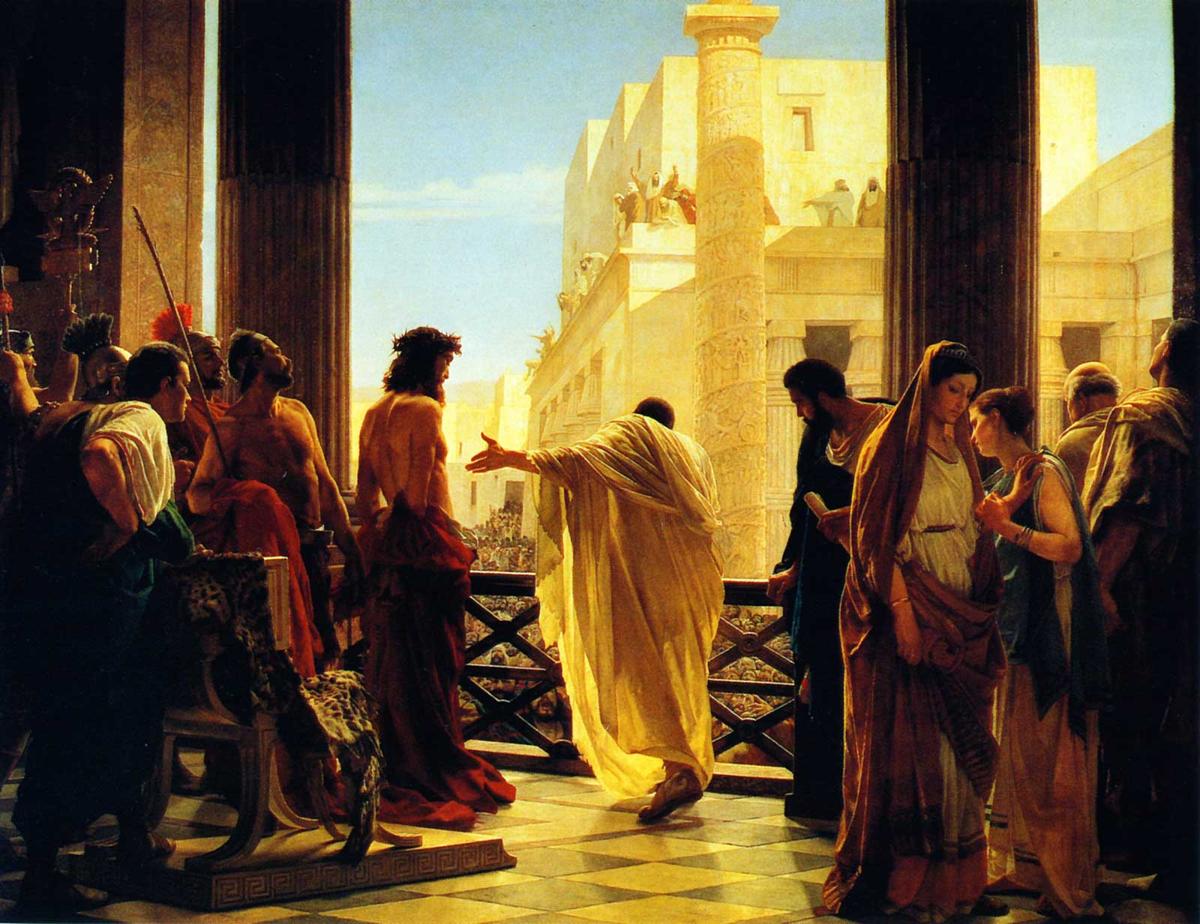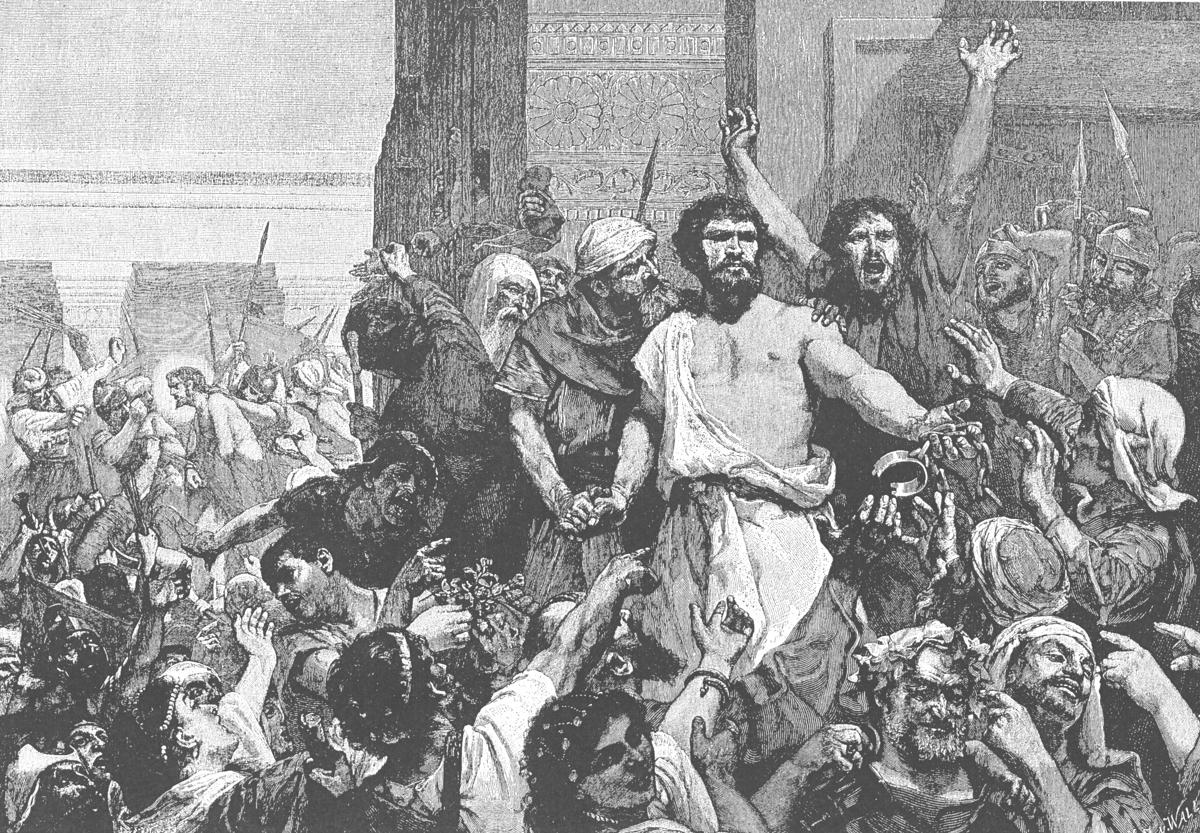March 25: Choosing Barabbas
♫ Music:
Wednesday, March 25
Scripture: Luke 23:13-25
Pilate then called together the chief priests and the rulers and the people, and said to them, “You brought me this man as one who was misleading the people. And after examining him before you, behold, I did not find this man guilty of any of your charges against him. Neither did Herod, for he sent him back to us. Look, nothing deserving death has been done by him. I will therefore punish and release him.” But they all cried out together, “Away with this man, and release to us Barabbas” — a man who had been thrown into prison for an insurrection started in the city and for murder. Pilate desiring to release Jesus, addressed them again but they kept shouting, “Crucify, crucify him!” A third time he said to them, “Why, what evil has he done? I have found in him no guilt deserving death. I will therefore punish and release him.” But they were urgent, demanding with loud cries that he should be crucified. And their voices prevailed. So Pilate decided that their demand should be granted. He released the man who had been thrown into prison for insurrection and murder, for whom they asked, but he delivered Jesus over to their will.
CHOOSING BARABBAS
Charles Louis Muller’s Give Us Barabbas and Antonio Ciserei’s Ecco Homo! combine to penetrate one of the most dramatic scenes of the Gospels. They show us two men who could hardly be more opposite, Barabbas and Jesus, portrayed in two strikingly different settings. Barabbas stands in the midst of turmoil on the edge of riot, which is doubtless both reflective of Luke’s narrative and reflective of Barabbas as a person—a riot waiting to happen.
In Ciserei’s Ecco Homo!, the setting is completely different. We stand in the shadows, the inner sanctum. We don’t see the face of Pilate, and barely that of Jesus. The crowd is distant. Barabbas is not in view at all. Our eyes are drawn to the silent bystanders—the watchers—like Pilate’s wife who whispers her dreams and fears in her husband’s ears. Soldiers and servants who make up the household but are not players in the drama. Viewers of this painting look through a tunnel of people like themselves: bystanders. It is an inward painting that almost begs the question, “What would I do if I were there? Who would I choose?”
At first pass, it seems simply inconceivable to choose Barabbas. He is such a singularly unlikeable character. He is alternatively described as a robber, a brigand, a murderer and an insurrectionist. All these descriptions are equally apt and equally disturbing. But surely these facts were obvious to those who chose Barabbas. What were they thinking?
Why would the crowd want Barabbas? Doubtless he robbed and murdered the sorts of people who made up the crowd! And why would the chief priests choose Barabbas? Even if they didn’t like how Jesus kept the law, surely Barabbas was far worse. And why would Pilate choose Barabbas? What could be worse for a Roman governor than a revolutionary?
The threads of their reasoning are in the Gospel narratives. The crowd wanted to please the chief priests and they bowed to their pressure. The chief priests wanted to please Pilate and the Roman powers shouting, “We have no King but Caesar!” Pilate, fearing a riot, wanted to appease the crowd. Let me get this straight: the crowd is pleasing the priests, the priests are pleasing Pilate, and Pilate is pleasing the crowd. This reasoning in a circle is both tight and silly! These were people with moral thermometers, not moral compasses. They were sensitive to their surrounding but they have no heading and can take no bearings. The lost looked to the lost to find their guide. The blind led the blind and both fell into the pit.
The power of Ciserei’s painting is that it forces us to look within, to consider our own lives and the voices that lead our choices. I view the paining and wonder whom would I have chosen?
The modern American crowd doesn’t shout for Barabbas but for “More!” But why? We buy goods we don’t need to impress people we don’t like using money we don’t have. Talk about a tight and silly circle. We climb a corporate ladder, but those who have been to the top are so often leading lives of quiet desperation. They are broken shells surrounded by material goods that mock their pain with resplendent wholeness. Yet knowing all this, I still feel the pull of consumer goods. I have far too often found myself googling items on my smartphone during my personal devotions. Devotion indeed—but to whom (or to what)? Who am I choosing?
And I suppose I have my chief priests as well: those power brokers inside my community. I am a professor; the power brokers of my community are deans, donors, students, colleagues, editors, publishers, grant reviewers, and popular media outlets. In my quiet moments, I realize how desperately I want to make a good impression…on everyone…always. But if I awake one morning and God calls me to speak an uncomfortable prophetic word, would I find my voice? Or have I lost my voice by daily tuning it to the key of my audience?
And then there is Pilate, the power broker of the world around us. Of course, as Christians we live as aliens and exiles to this world. We are a peculiar people, to borrow Paul’s phrase. But how peculiar are we? It is distressing to hear how often Christian behavior conforms to secular behavior. On matters from pre-marital sex, to divorce, to movie watching, to excessive spending, to excessive eating, to viewing pornography, to stingy giving, to environmental pillaging, to judging and hating our neighbors, in poll after poll, Christian behavior is well nigh indistinguishable from non-Christian behavior. Just because we no longer have Pilate, does not mean we no longer have a secular governor.
So to each of us comes the question, who’s voice are we listening to? Whom will we choose? Despite the longing for Jesus that stirs in our hearts, the shouts of the crowds still ring in our ears… choosing between Jesus and Barabbas is never as easy as it sounds.
PRAYER
Lord, help me to disavow the things of Barabbas. I choose Jesus, the one who first chose me. He chose to love me when I felt unlovable. He chose to reach out to me, when I felt worthless. Unashamed, I choose Jesus for now and for eternity. Help me by thy Holy Spirit to keep this sacred promise.
Amen.
Rick Langer, Talbot School of Theology, Office for the Integration of Faith & Learning
Give Us Barabbas
(From The Bible and its Stories Taught by One Thousand Picture Lessons)
Charles Louis Müller
1878
&
Ecco Homo! (Behold the Man!)
Antonio Ciserei
1891
Galleria dell’Arte Moderna, Palazzo Pitti, Florence
Oil on canvas
About the Artist & Art (Piece 1)
Charles Louis Müller (1815 – 1892) was a French painter and member of the Académie des Beaux-Arts. He painted numerous portraits and historical scenes, and painted frescoes for the ceilings of some public spaces in Paris. Give Us Barabbas was included in The Bible and its Story Taught by One Thousand Picture Lessons, a 10-volume set edited by Charles F. Horne and Julius A. Bewer and published in 1910. It included illustrations from every book of the Bible by both famous and lesser-known artists.
About the Artist & Art (Piece 2)
Antonio Ciserei (1821 – 1891) was born in Switzerland, but lived in Florence, Italy for most of his life. He was painter of portraits and religious scenes whose technique has been compared to the Renaissance painter, Raphael. He also ran a private art school and completed many commissions for churches in Italy and Switzerland.
About the Music
Give Us Barabbas! (From Water Passion) lyrics
You—ha ha,
Prophesize for us, Messiah!
If you are the Son of God,
Tell us who hits, who spits, who slaps you now!
You—ha ha, the king of Jews!
If you come down off the cross,
We will believe you now!
He can tear down the temple,
And build it up again in three days!
Blasphemy!
Which one do you want: Barabbas the thief,
Or Jesus called Messiah?
Messiah? Messiah? Messiah?
Give us Barabbas!
Are you the Son of God?
You have said so.
For this I was born,
For this I came into the world,
To give witness to the truth.
Kill him! Kill him!
Eli Eli Lama Sabachthani ...
Father, forgive them
For they know not what they do!
About the Composer & Performers
Tan Dun (b. 1953) is a contemporary Chinese composer. He studied at the Central Conservatory of Beijing, and at Columbia University in New York. He wrote Water Passion After St. Matthew in 2000 to honor the 250th anniversary of the death of Johann Sebastian Bach.
http://tandun.com/
The RIAS Kammerchor is a professional chamber choir in Berlin, founded by the Rundfunk im amerikanischen Sektor (Broadcasting in the American Sector) in 1948. They now regularly perform classical pieces, as well as premier works by contemporary composers.
http://www.rias-kammerchor.de/content/index_ger.html

